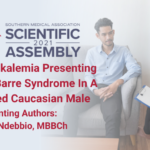Abstract | November 9, 2021
Severe Hypokalemia Presenting As Guillian-Barre Syndrome In A Middle-Aged Caucasian Male
Learning Objectives
- Manage Acute hypokalemic paralysis with aggressive IV potassium with resolutin of symptoms within hours to days;
- Identify the cause of hypokalemia in such patients and treat which requires extensive workup to treat the cause;
- A good list of differentials with a proper history and examination will always have a place in evidence based medicine and holistic patient care.
Introduction: Acute neurological paralysis is a common cause of neurological emergencies seen in the emergency room in the United States with Guillian-Barre syndrome (GBS) by far the most common cause. GBS presents as an acute or chronic ascending muscle weakness which is flaccid in nature with areflexia and hypotonia. Other differentials include Periodic hypokalemia paralysis from hypothyroidism or hyperthyroidism or hypomagnesimea. Severe hypokalemia can also present as an acute neurological paralysis with life threatening neurological manifestations like GBS leading to a dilemma of diagnosis for Physicians in the acute setting.
Case Presentation: This is a case of a 41 year-old male who was transferred from a neighboring hospital following a 3-day history of worsening ascending like paralysis with potential respiratory compromise. A CT of the head without contrast was negative but his lab work showed K 1.2 mmol/L with other labs normal. He was given IV KCL but was unstable warranting immediate transfer with concerns for GBS. His wife stated that the patient has had recurrent episodes of nausea, vomiting and diarrhea for over 3 weeks after being diagnosed with COVID-19 pneumonia.
Diagnosis and Treatment: He was admitted to the ICU intubated for airway protection with GBS and a differential of Acute Hypokalemic Paralysis (AHP) with IVIG and aggressive potassium replacement initiated. The patient regained full strength within 24hours with potassium replacement and GBS ruled out at that point. He was further worked up to establish the cause of his severe hypokalemia.
Discussion: This case attempts to further highlight the importance of offering holistic care to all our patients based on evidence-based medicine. The patient response to treatment was more in keeping with AHP than with GBS. GBS resolution tends to take week to months compared to AHP which occurs mostly in days.

